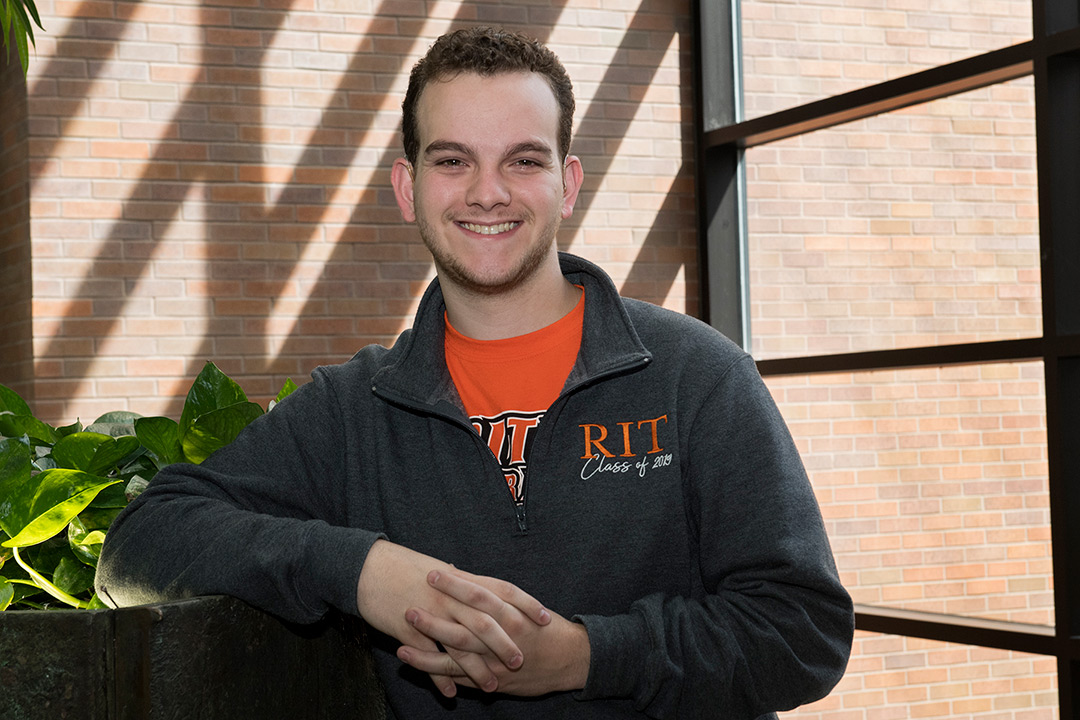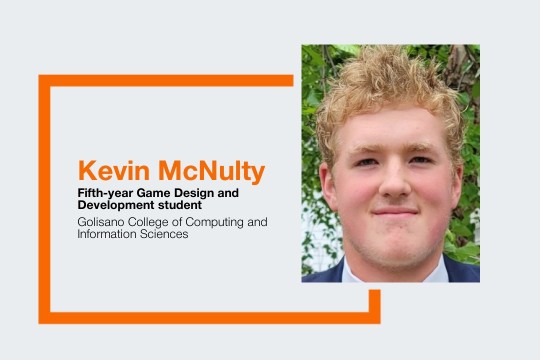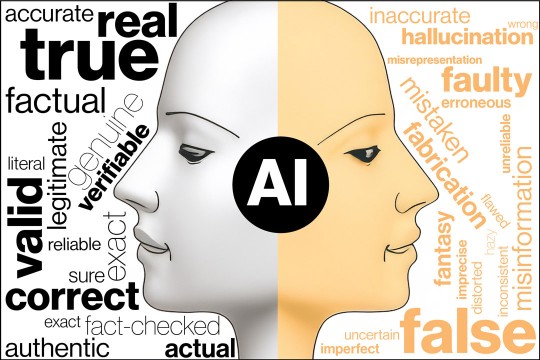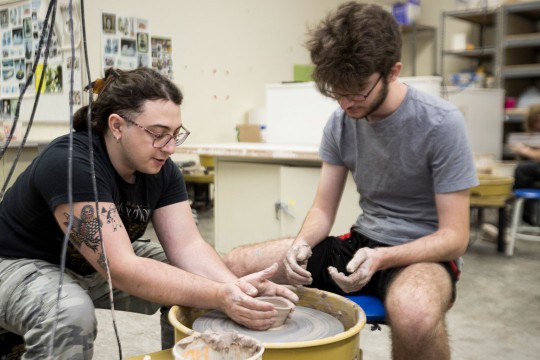RIT/NTID provides groundwork for grads moving on to doctoral degree programs
NTID graduates help fill need for deaf, hard-of-hearing researchers, Ph.D. candidates
Mark Benjamin
Abraham Glasser, a fourth-year computer science major, will join seven other RIT/NTID students moving on to Ph.D. programs around the country.
Commencement weekend kicks off with Academic Convocation on May 10. Read more about the Class of 2019 at rit.edu/news/commencement-news.
Abraham Glasser, a fourth-year computer science major from Pittsford, N.Y, wasn’t certain where he would land after graduation. But he credits his co-op experiences at Microsoft and NASA for helping him determine that he didn’t want a typical 9-to-5 job. Instead, he realized that a career developing accessible technologies for deaf and hard-of-hearing people would fulfill a passion for research. Glasser, who graduates in May from Rochester Institute of Technology’s National Technical Institute for the Deaf, will join seven other graduates moving on to Ph.D. programs. Glasser will continue his education in RIT’s computing and information sciences doctoral degree program.
“At first I thought that I would become a college professor because I’ve spent time tutoring other students,” Glasser said. “But then my passion for accessible technology grew throughout working part-time at NTID’s Center on Access Technology. I was able to get an insider’s view working on the technology, rather than simply using it. This is also where I realized my potential for research. I found myself thinking about research approaches that were sparked by my work and I knew that I wanted to get a Ph.D., so I could do research with my own ideas.”
In addition to support from faculty mentors and advisors, several programs at NTID are making a difference for graduates applying to Ph.D. programs around the country and helping to fill the gap that still exists when it comes to deaf and hard-of-hearing researchers.
Glasser credits his participation in programs like the National Science Foundation-funded Research Experience for Undergraduates (REU) for helping him hone in on his passion. The program introduces young scientists to research in a highly interdisciplinary, team-oriented setting, preparing the students for the type of goal-oriented research they are likely to encounter in real-world environments. “I’m very happy that I got involved in a REU program. I had the opportunity to work on my research ideas, and I even got published at top-tier conferences.”
“Programs like these give deaf and hard-of-hearing students like myself opportunities for exposure to research,” he said. “These days, as an undergraduate, you have to be involved to know what research is like. Here at RIT, we have the deaf community as well as a hearing community that knows about deaf culture. There are few barriers to communication, which enables deaf and hard-of-hearing people to do whatever they want to do.”
He is eager to continue his work in human-computer interaction at RIT’s Center for Accessibility and Inclusion Research. Throughout the course of his Ph.D. program, he will be working to further develop an American Sign Language Dictionary—a collaborative effort with another university that hopes to make it easier to look up an unfamiliar sign—as well as investigating and developing evidence-based metrics for the quality of closed captions on video.
Caroline Davis, a fourth-year biomedical sciences major from Malvern, Pa., will begin a doctoral degree program in occupational therapy at University of the Sciences in Philadelphia after her May graduation from RIT. “I decided to pursue a doctoral degree because in addition to practicing occupational therapy with a focus on pediatrics, I am also interested in research.”
“The biomedical sciences program helped me prepare for my upcoming doctoral program,” said Davis. “I took a Premedical Studies Seminar course during my third year, which helped me prepare for applications and interviews for medical or health professionals programs.”
RIT has funded programs by the National Institutes of Health and National Science Foundation designed for students who are underrepresented in research careers—including deaf and hard-of-hearing students—that provides them with the skills and knowledge they need to succeed in their aspiring careers. One example, the Rochester Bridges to the Doctorate program, a partnership with University of Rochester, helps eligible students in a master’s program at RIT prepare and apply for a doctorate-level program in behavioral or biomedical science. Another example, the RIT-RISE program, is designed to increase the number of deaf and hard-of-hearing scientists through unique research opportunities and experiences.
“RIT’s core values and aim to increase research activities on campus is having a positive impact on deaf and hard-of-hearing students’ preparation for research careers,” said Peter Hauser, professor and director of the NTID Center on Cognition and Language and RIT program director for Bridges to the Doctorate. “We are now seeing the emergence of a pipeline designated for deaf and hard-of-hearing students that provides them the skills and knowledge they need to succeed in doctoral training and research careers. Deaf and hard-of-hearing students have been able to work in faculty laboratories to receive hands-on research experiences and have been able to present their work at conferences. These opportunities make our students excellent candidates for doctoral programs.”
Both Glasser and Davis are grateful for faculty mentors who have guided them in the right direction, offered practical knowledge about finding funding and the application process, and provided support and encouragement.
“My Ph.D. adviser, Matt Huenerfauth, works very closely with me,” said Glasser. “He helped me create realistic goals about my plans for the next few years. He’s always willing to talk with me. It’s so important to have a strong adviser because this process can be difficult. He’s one of the best advisers on campus, in my opinion.”
Huenerfauth, a professor in RIT’s Golisano College of Computing and Information Sciences and director of the Center for Accessibility and Inclusion Research, said that it’s important that his team includes multiple researchers with firsthand perspectives about how computing technology can benefit people who are deaf and hard of hearing.
“The unique environment of RIT enables us to bring new students to our team to create opportunities for tiered mentoring of deaf students who are at different points in their academic careers,” he said. “This sparks ideas and enables us to conduct research that other groups internationally cannot; it also creates a valuable, dynamic and bilingual (English and ASL) educational environment for all of our student researchers.”
Davis added: “I think it’s awesome that more and more deaf and hard-of-hearing students are going on to pursue PhDs. It has been, in the past, more of a hearing-dominated course of study. So I think it’s amazing that there are people like me who will prove we are capable of doing it, too.”








